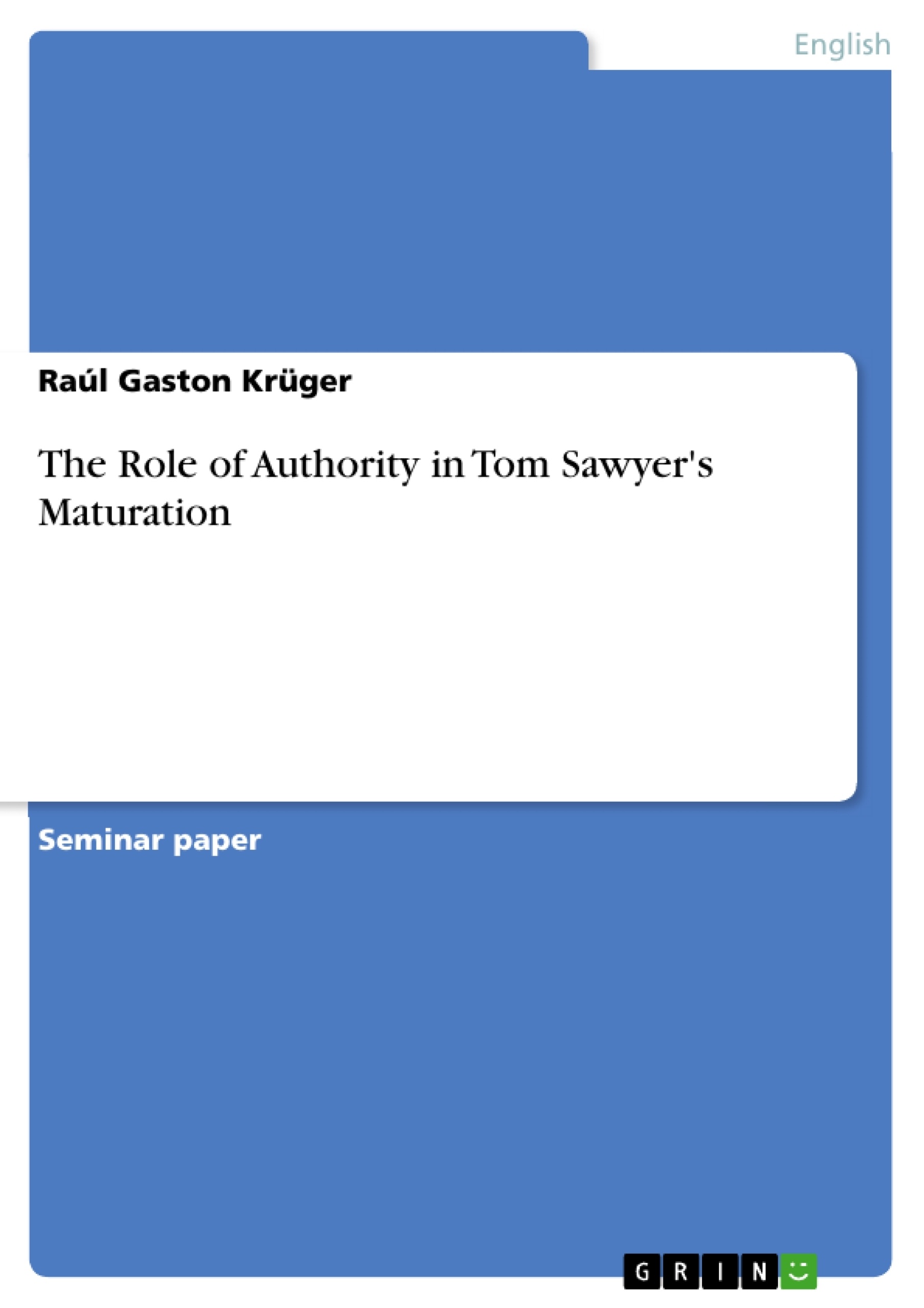This paper accompanies the bad boy Tom Sawyer on his journey from boyhood to manhood, regarding the influence authority has on him as the most important factor for his maturation.
Samuel Clemens wrote The Adventures of Tom Sawyer “mainly for the entertainment of boys and girls” but also “to try pleasantly to remind adults of what they once were them-selves” (Preface). What is the difference between children and adults? – Above all, their degree of maturity. But what is essential for the transition from child to adult, for the maturation? – Essential is to form an own individuality; to be something unique you have to distinguish from everything else. Therefore, we have to leave our own marks in order to become individuals. Every child has to find this “unique own” in adolescence. Not only bad boys need to revolt against and differentiate from authority to become part of the adult world and to constitute their individuality. But what exactly is this ‘authority’, which seems so essential for maturation – and, therefore, for the purpose of this work?
In the broadest sense authority is a representative of the adult world with all its rules, conventions and institutions, which Clemens so harshly and ironically criticizes. For the purpose of this paper, authority means specifically every form of influence the adult world has on Tom as well as every convention which has the ability to govern his actions. Thus, it ranges from the school superintendant and Aunt Polly to bad boy behavior patterns and the temptations of evil.
It does not take the reader long to find out that in the character of Tom Sawyer the force to defy authority is extraordinary strong. The first line in the book is a shouted “TOM!” (I, 7) and of course the shout is not unfounded. Totally in the manner of a bad boy, he is stealing jam and afterwards escapes his aunt’s authority. But not only his disposition to overcome authority, also the occasion to face the evil, the lenience of authority, as well as its absence in determining situations are responsible for Toms maturation. Finally, the whole process of becoming an adult can only be completed by the acceptance of the authority of society. Hence, authority in all its shapes is the key to maturation – also for Tom Sawyer, our freedom loving, seemingly anti-authoritarian and independent hero.
Inhaltsverzeichnis (Table of Contents)
- PREFACE
- TOM'S DISPOSITION TO OVERCOME AUTHORITY
- THE LENIENCE OF 'GOOD' AUTHORITY
- THE QUANTUM OF ‘EVIL' AUTHORITY
- THE ABSENCE OF AUTHORITY
- THE ACCEPTANCE OF AUTHORITY
- CONCLUSION
Zielsetzung und Themenschwerpunkte (Objectives and Key Themes)
This paper analyzes the role of authority in Tom Sawyer's maturation, exploring how it influences his journey from boyhood to manhood. The central argument is that authority, in its various forms, acts as a catalyst for Tom's development and his eventual acceptance of the adult world.
- Tom Sawyer's inherent tendency to challenge and defy authority
- The impact of different forms of authority, both positive and negative, on Tom's growth
- The significance of authority in shaping Tom's actions and decisions
- The process of Tom's gradual acceptance of authority as he matures
- The role of rebellion and questioning authority in Tom's journey to adulthood
Zusammenfassung der Kapitel (Chapter Summaries)
- Preface: This section introduces the concept of authority as a key factor in Tom Sawyer's maturation and highlights the significance of the protagonist's rebellion against societal norms and conventions.
- Tom's Disposition to Overcome Authority: This chapter delves into Tom's innate desire to defy authority and explores how his rebellious nature drives him towards adventure and growth. It examines how Tom's actions, such as escaping school, defying his aunt, and engaging in risky behaviors, serve as stepping stones in his journey to manhood.
- The Lenience of 'Good' Authority: This chapter discusses the role of positive authority figures, such as Aunt Polly and the school master, in Tom's development. It examines how their guidance and leniency, while sometimes met with resistance, ultimately contribute to Tom's maturation.
- The Quantum of ‘Evil' Authority: This chapter explores the influence of negative authority figures, such as Injun Joe and other antagonists, on Tom's actions and growth. It investigates how encounters with these figures shape Tom's understanding of the world and his developing sense of morality.
- The Absence of Authority: This chapter examines the impact of situations where authority is absent or ineffective on Tom's actions and development. It explores how Tom navigates these challenging situations, often relying on his own judgment and instincts, ultimately gaining valuable life lessons.
- The Acceptance of Authority: This chapter discusses the process of Tom's gradual acceptance of authority as he matures. It examines how his experiences, both positive and negative, lead him to a deeper understanding of societal rules and conventions, ultimately shaping his own sense of responsibility and self-reliance.
Schlüsselwörter (Keywords)
The central focus of this work is the role of authority in the process of maturation, specifically within the context of Mark Twain's The Adventures of Tom Sawyer. Key themes include the dynamics of rebellion and conformity, the impact of different forms of authority, and the development of individual identity within a structured society. Furthermore, the analysis emphasizes the significance of key characters like Tom Sawyer, Aunt Polly, and Injun Joe, as well as the exploration of conventions and institutions prevalent in the 19th-century American society.
- Quote paper
- Raúl Gaston Krüger (Author), 2009, The Role of Authority in Tom Sawyer's Maturation, Munich, GRIN Verlag, https://www.grin.com/document/175795




